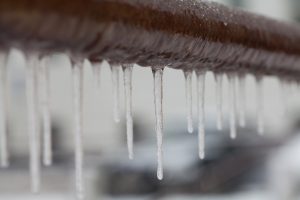
“Wait,” you may be wondering, “it was in the 90’s still last week, why are we talking about this?”
We get it, fall has barely started, and it’s rather rare that temperatures in the Woodstock area drop below 30°F in the winter anyway. But, rare doesn’t mean never, and it’s far better to be prepared for the possibility than not. How can you do this? Read on!
The Problem with Frozen Pipes
It first helps to know the problem with frozen pipes—it isn’t so much that they’ve frozen, but rather what happens when they thaw. The thawing process creates negative pressure within the pipe, causing it to expand and contract. As you might imagine, this can lead to cracks in the plumbing, causing leaks or even burst pipes. Once that happens, you’re in for a big cleanup and potentially even recovering damaged property.
Before we get any closer to the holiday season and your mind turns to anything but your plumbing system, we’d like to share some tips with you below on how to prevent this problem, should temperatures dip lower than expected this year.
Open Your Faucets: It’s wintertime, and the weather forecaster predicted it’s going to drop down below 30°F tonight. What should you do first? Open your outdoor faucets! These are the pipes most vulnerable to freezing, understandably.
Anything outdoors—sprinklers, hoses—should have their water flow shut off. Open the faucets and drain any extra water, then leave the faucets open. You may also want to get some insulated caps for your home and faucet openings.
While you’re at it, disconnect any hoses you have, and drain those too.
Insulate Your Pipes: This is one you can do regardless of whether or not you’re expecting temperatures to dip this winter—it’s a good way to be proactive! There are pipes in your home that are sensitive to freezing temperatures, but you still have to use—so you can’t just open their faucets and shut off the water supply. This typically includes pipes that are under the sink, in crawlspaces, or in basements.
In order to protect them from freezing, the easiest thing you can do is purchase some pipe insulating sleeves from your nearest hardware store. This helps keep the temperature of the water in your pipes steady. You can accomplish this with towels, too, though pipe insulators are probably more affordable. The point is that you try to keep your pipes as warm and insulated as possible in the wintertime.
Keep Your Cabinets Open: On exceptionally chilly nights, the pipes in your walls that face the outdoors are susceptible to freezing. This means the pipes attached to your drains and faucets in the bathroom and kitchen area of your home. If you leave the cabinet doors cracked a bit, however, you allow the heat from your furnace to reach them, reducing the likelihood that you’ll have a frozen pipe problem.
When you need a trusted, professional plumber in Woodstock, GA, contact DC Cheek Heating, Cooling & Plumbing. We’ll get your plumbing “Fixed, at the Speed of Life!”



